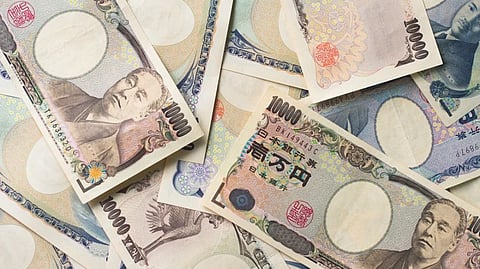

LONDON: The Japanese yen fell on Friday after the Bank of Japan (BOJ) stood pat on its ultra-easy monetary policy, while the U.S. dollar was on track for a second straight monthly loss.
In a closely watched decision, the BOJ on Friday announced it will maintain ultra-low interest rates, as expected, and made no tweaks to its yield curve control by a "unanimous vote". However, the BOJ said it will remove forward guidance that pledges to keep interest rates at current or lower levels.
The yen slid in volatile trade following the decision, and was last 0.5% lower against the dollar at 134.60 . It had jumped in the immediate aftermath of the decision, before reversing its gains.
Earlier on Friday, government data showed that core consumer prices in Japan's capital, Tokyo, rose 3.5% in April from a year earlier, beating market forecasts in a sign of broadening inflationary pressure in the world's third-largest economy. "This puts pressure on the BOJ, they might do something in the near future," said Tina Teng, market analyst at CMC Markets.
In the wider currency market, the U.S. dollar found some support from data pointing to still-sticky inflation in the United States, which reinforced expectations for a 25-basis-point rate hike at next week's FOMC meeting. . Against a basket of currencies, the U.S. dollar index rose 0.1% to 101.55, though remained on track for a monthly loss of about 1%, after having fallen about 2.3% in March.
Sterling slipped 0.06% to $1.2492. Data released on Thursday showed that while U.S. economic growth slowed more than expected in the first quarter, consumer spending, which was accompanied by a rise in inflation, accelerated.
A measure of inflation in the economy, the price index for gross domestic purchases, rose at a 3.8% pace after increasing at a 3.6% rate in the fourth quarter, while the core PCE price index jumped at a 4.9% rate after advancing at a 4.4% pace in the prior quarter. "The Fed is widely expected to hike again next week but with inflation remaining sticky, we expect the Fed to stay on hold for the remainder of the year, dashing hopes of a policy pivot in (the second half)," said analysts at Societe Generale.
Elsewhere, the euro fell 0.1% to $1.1016, but remained near its recent one-year high. The common currency was eyeing a monthly gain of more than 1.5%. The euro has been buoyed by expectations the European Central Bank still has more to go in raising interest rates, in contrast with a dovish repricing of its U.S. counterpart.
"Investors favour currencies that can offer both an ongoing domestic tightening cycle and still some room for a hawkish surprise at the coming meetings," said ING analysts. "In that sense, the euro is one of the very few currencies that can offer this combination at the moment." Down Under, the Australian dollar was flat at $0.6630, while the kiwi gained 0.09% to $0.6153.
Visit news.dtnext.in to explore our interactive epaper!
Download the DT Next app for more exciting features!
Click here for iOS
Click here for Android